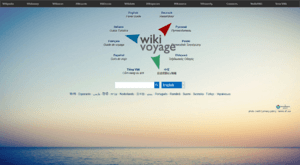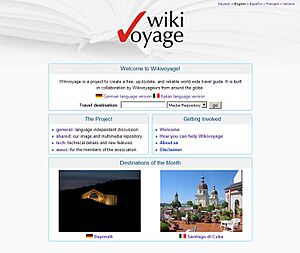Wikivoyage facts for kids
 |
|

Screenshot of Wikivoyage's portal
|
|
|
Type of site
|
Wiki |
|---|---|
| Available in | 22 active editions (Bengali, Chinese, Dutch, English, Finnish, French, German, Greek, Hebrew, Hindi, Italian, Japanese, Pashto, Persian, Polish, Portuguese, Romanian, Russian, Spanish, Swedish, Ukrainian, Vietnamese) |
| Headquarters | United States |
| Owner | Wikimedia Foundation (non-profit) |
| Created by | Wikivoyage e.V. association |
| Alexa rank | |
| Commercial | No |
| Registration | Optional |
| Launched | January 15, 2013 |
|
Content license
|
CC-BY-SA 3.0 |
Wikivoyage is a free online guide for travel and tourism. It's like a huge, helpful book about places all over the world. Many people write and edit it together. This is called a "wiki," which means anyone can help improve the articles.
The name "Wikivoyage" mixes "wiki" with "voyage." "Voyage" is a French word meaning a journey or trip. So, it's a wiki for your travels!
Wikivoyage first started in December 2006. It began as a German-language guide, written by volunteers from Germany and Switzerland. A German non-profit group called Wikivoyage e.V. owned it then. An Italian version of the guide began in December 2007.
In 2012, content from another travel guide, Wikitravel, was moved to Wikivoyage. At the same time, Wikivoyage joined the Wikimedia Foundation. This is a non-profit group that also runs Wikipedia, the free encyclopedia. Wikivoyage officially re-launched with Wikimedia on January 15, 2013.
When it re-launched, Wikivoyage was available in many languages. These included German, Italian, English, French, Dutch, Russian, Swedish, Portuguese, and Spanish. The English version is the largest. In September 2016, it had over 27,400 articles.
Contents
What You'll Find on Wikivoyage
Wikivoyage is created by people called "Wikivoyagers" from all over the world. They work together to write articles. These articles cover many different places, from entire continents to small parts of a city.
The main types of articles you'll find are:
- Destination guides
- Travel plans (itineraries)
- Phrasebooks for different languages
- General travel topics
Destination Guides
These articles describe specific places you can visit. They answer the question, "Can you sleep there?" This means they focus on places where travelers might stay.
The guides cover places in a specific order, from big to small:
- Continents (like Africa or Asia)
- Parts of Continents (like Southeast Asia)
- Countries (like France or Japan)
- Regions inside countries (like states, provinces, or groups of states)
- Cities of any size, even small villages if they are popular with tourists
- Districts within large cities
- National parks that offer places for travelers to stay
Destination articles list many interesting things. These include hotels, restaurants, shops, museums, and parks. They also mention transport systems, festivals, and other attractions.
Travel Plans (Itineraries)
An itinerary is a list of places to visit and things to do during a trip. It suggests how long to stay in each spot. It also gives ideas for routes to follow. These plans usually have a clear path from one place to the next.
Phrasebooks
Phrasebooks help you learn basic words and phrases for a language. Each phrasebook has a few parts:
- An overview of the language. This includes its history, where it's spoken, and how many people speak it. It also covers the alphabet or symbols used.
- A guide to pronunciation. This explains how to say each letter or symbol in the language.
- A list of useful phrases. Each entry shows the word or phrase in English. Then it shows how to write it in the local language. Finally, it gives a hint on how to pronounce it.
Travel Topics
Travel topics cover information that is too big or too detailed for a single destination guide. This includes general travel advice that applies to many places. It also covers major events that happen in different locations. You might also find special information, like where to go for scuba diving.
See also
 In Spanish: Wikiviajes para niños
In Spanish: Wikiviajes para niños
 | Kyle Baker |
 | Joseph Yoakum |
 | Laura Wheeler Waring |
 | Henry Ossawa Tanner |


